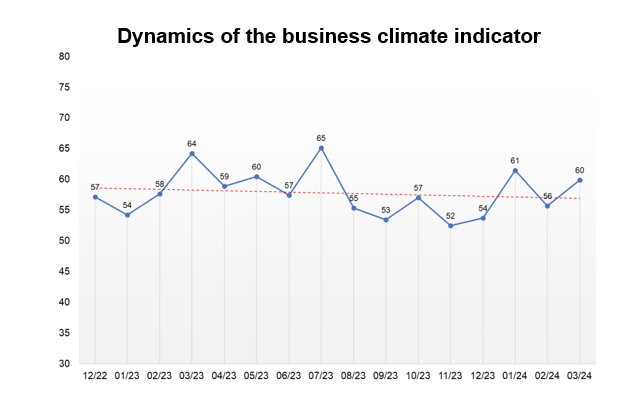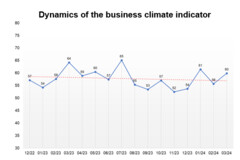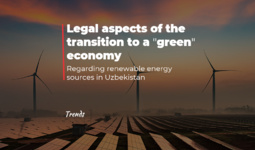Business climate is an analytical indicator that is calculated monthly based on a survey conducted by the Center for Economic Research and Reforms starting in 2020.
The participation of enterprises in surveys makes it possible to assess the current economic situation before it is reflected in official statistics. In addition, the expectations of enterprises represent leading indicators of economic activity.
The growth of the consolidated business climate was determined by the positive dynamics of both current estimates and expectations.
In March, the consolidated business climate indicator increased by 4 points to 60 compared to February, which indicates a further expansion of business activity. Whereas in March last year, the combined figure was 64 points.
The positive dynamics in agriculture and the industrial sector had a significant impact on improving the business climate.
In agriculture, the business climate indicator soared by 20 points in a month. Among the main reasons are an improvement in positive business assessments regarding the current state of enterprises by 4 percentage points (p.p.), an increase in demand by 6 p.p., and an increase in the number of employees by 14 p.p. In addition, expectations in the sector about the future state of their enterprises increased by 4 p.p.

In March, the business climate in the industry increased by 2 points. The main reason for this was the improved forecasts of entrepreneurs about the current and future state of their enterprises. According to the survey, 36% of companies estimated the current state of the industry as good, which is 7 p.p. higher than last month. Managers in this sector also forecast 5 p.p. increase in demand.
At the same time, the March survey results reflected a decrease in the estimates of enterprises in the construction sector by 4 points and in the service sector by 3 points, respectively.
So, in construction, estimates of the current state decreased by 10 points in March, and expectations for an improvement in demand decreased by another 4 p.p.
In the service sector, the level of expectations regarding business growth in the future remained unchanged at a fairly high level – about 80% of companies. At the same time, expectations for an increase in the number of employees decreased by 3 p.p.
Current business assessments have improved in most economic activities.
Estimates of the current state of the business, relative to last month, increased by 6 points to 44. In turn, this is due to fluctuations in indicators of the current state in industry, construction and agriculture. If the main contribution to improving the current state of business in March was in agriculture, where the growth was 25 points, then in the service sector there was a decrease of 3 points.
Expectations of business development prospects signal a fairly high level of optimism among entrepreneurs.
The consolidated indicator of expectations regarding business development prospects in the next 3 months reached 77 points, mainly due to improved optimism in agriculture and industry of 15 and 1 points, respectively.
In March, the relationship between the current state and expectations showed a positive trend in the development of the economy, which will continue in the next three months.
About half of the surveyed entrepreneurs noted the presence of barriers to doing business.
Entrepreneurs in the industry have become more concerned about problems related to financing, high interest rates and electricity supply. On the contrary, there has been a decrease in problems related to the supply of gas in industry and low demand.
The main problems for businesses in agriculture are related to the supply of water and electricity.
The success rate in the fight against corruption in the construction sector is relatively high.
At the same time, problems related to high tax rates and financing in the service sector have increased.
In general, the problems that entrepreneurs consider the most acute include financing, high interest rates and tax administration.
Sunatilla Zikrillaev, CERR
Phone.: (+998) 78 150-02-02 (416)






















leave a comment